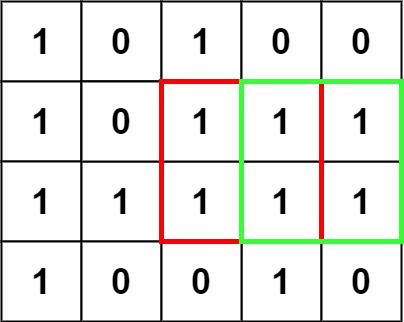LeetCode-in-All
221. Maximal Square
Medium
Given an m x n binary matrix filled with 0’s and 1’s, find the largest square containing only 1’s and return its area.
Example 1:

Input: matrix = [[“1”,”0”,”1”,”0”,”0”],[“1”,”0”,”1”,”1”,”1”],[“1”,”1”,”1”,”1”,”1”],[“1”,”0”,”0”,”1”,”0”]]
Output: 4
Example 2:

Input: matrix = [[“0”,”1”],[“1”,”0”]]
Output: 1
Example 3:
Input: matrix = [[“0”]]
Output: 0
Constraints:
m == matrix.lengthn == matrix[i].length1 <= m, n <= 300matrix[i][j]is'0'or'1'.
Solution
-spec maximal_square(Matrix :: [[char()]]) -> integer().
maximal_square([]) -> 0;
maximal_square([[]|_]) -> 0;
maximal_square(Matrix) ->
M = length(Matrix),
N = length(hd(Matrix)),
% Initialize DP array with all zeros
DP = lists:duplicate(M + 1, lists:duplicate(N + 1, 0)),
% Iterate through matrix and build DP table
{MaxSquare, _} = lists:foldl(
fun(I, {MaxSoFar, DPCurrent}) ->
process_row(I, Matrix, N, MaxSoFar, DPCurrent)
end,
{0, DP},
lists:seq(1, M)
),
MaxSquare * MaxSquare.
process_row(I, Matrix, N, MaxSoFar, DP) ->
lists:foldl(
fun(J, {CurrentMax, CurrentDP}) ->
case lists:nth(J, lists:nth(I, Matrix)) of
$1 ->
Val1 = get_dp_value(CurrentDP, I-1, J),
Val2 = get_dp_value(CurrentDP, I, J-1),
Val3 = get_dp_value(CurrentDP, I-1, J-1),
NewVal = 1 + min3(Val1, Val2, Val3),
NewDP = set_dp_value(CurrentDP, I, J, NewVal),
{max(CurrentMax, NewVal), NewDP};
_ ->
{CurrentMax, CurrentDP}
end
end,
{MaxSoFar, DP},
lists:seq(1, N)
).
get_dp_value(DP, I, J) when I > 0, J > 0 ->
lists:nth(J + 1, lists:nth(I + 1, DP));
get_dp_value(_, _, _) -> 0.
set_dp_value(DP, I, J, Value) ->
Row = lists:nth(I + 1, DP),
NewRow = list_set(Row, J + 1, Value),
list_set(DP, I + 1, NewRow).
list_set(List, Pos, Value) ->
{Head, [_|Tail]} = lists:split(Pos - 1, List),
Head ++ [Value] ++ Tail.
min3(A, B, C) ->
min(A, min(B, C)).
max(A, B) when A > B -> A;
max(_, B) -> B.

